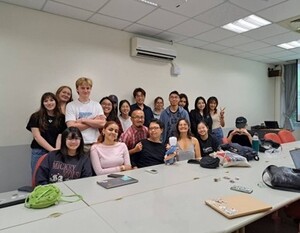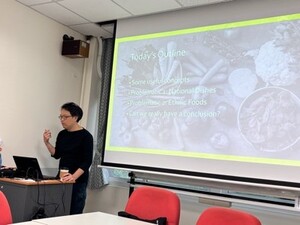Exploring Food, Identity, and Stereotypes: Professor Wu-Ken Shih Delivers Captivating Lecture at NCCU



【Article by IMICS】
On May 7th, 2025, the students of International Master’s Program in Communication Studies (IMICS) at National Chengchi University (NCCU) were treated to a thought-provoking guest lecture titled “Food, Stereotypes, and Identity,” delivered by Professor Wu-Ken Shih. Drawing from a wide range of sociological and anthropological theories, Professor Shih guided the class through a rich and layered exploration of how food is far more than just sustenance—it is a symbol, a language, and a battleground of cultural practice.
The session began with a simple but essential question: Why study food and foodways? Professor Shih explained that understanding food helps us decode the systems of meaning within societies. As social scientists, as consumers, and as passionate food lovers, our daily choices about what we eat reflect broader issues of power, identity, and social structure.
Classical Thinkers, Modern Relevance
Throughout the lecture, Professor Shih drew upon foundational thinkers whose work links cuisine to culture. From Claude Lévi-Strauss, who analyzed foodways as a kind of grammar or deep structure of culture, to Roland Barthes, who famously argued that food, like language, conveys meaning, students were encouraged to think critically about the everyday.
Jack Goody and Pierre Bourdieu were also highlighted for their contributions to understanding how cuisine mirrors social hierarchy. Goody’s analysis of high and low cuisines as tied to technological conditions of food surplus helped contextualize inequality, while Bourdieu’s work on taste and “cultural capital” offered a lens through which to view food as a symbol of class and status.
Professor Shih emphasized that even the most personal food choices can be deeply social acts. As Jean-Louis Flandrin observed, taste is not just biological but shaped by history, fashion, and group belonging. These frameworks prepared students to tackle the two central themes of the lecture: the invention of national dishes and the stereotyping of ethnic food.
Invented Traditions and the Politics of Flavor
Professor Shih then turned to what he called “Problematic 1”: National Dishes. Drawing on theories from Benedict Anderson and Eric Hobsbawm, he argued that many so-called traditional foods are actually modern inventions, closely linked to processes like industrialization, urbanization, and nationalism.
For instance, dishes like Pho, Pad Thai, and Gimbap were presented not as timeless national treasures but as products of colonial history, international trade, and political agendas. In the case of Taiwan, even well-loved items such as beef noodles and the Taiwanese club sandwich were linked to Cold War geopolitics and American influence during the Kuomintang administration.
This led to an eye-opening discussion on how foods are shaped by and shaping the idea of nationhood. Professor Shih asked students to question: Are national dishes truly authentic, or are they symbols manufactured to serve a political or sociopsychological purpose?
Stereotypes, Status, and the Exotic
“Problematic 2” tackled ethnic food and the stereotypes that often surround it. Using examples from the restaurant industry, media, and advertising, Professor Shih explained how branding frequently relies on exoticized imagery and assumptions. From “palace” restaurants that evoke fantasy versions of Chinese or Indian culture to “authentic” street food labels marketed toward foodies, ethnic cuisine is both celebrated and constrained by how it’s perceived.
Drawing on John Urry’s concept of the “tourist gaze,” Professor Shih illustrated how expectations—shaped by media, colonial narratives, and consumer culture—determine what is seen as exotic, authentic, or desirable. Even dishes such as General Tsao’s Chicken or Chicken Tikka Masala, now considered everyday meals in the United States and the UK, were revealed as hybrid products shaped by empire, migration, and adaptation.
Open Questions, Lasting Impressions
The lecture concluded with a reflective discussion. Professor Shih posed critical questions: Are stereotypes inevitable? Can we ever escape the subjectivity of “authenticity”? Rather than offering a fixed answer, he invited students to stay curious and thoughtful about how food operates as a mirror of society.
Throughout the session, students engaged in lively dialogue, sharing their own food experiences and reflections. Many were surprised to discover how many of their assumptions about “traditional” cuisine were shaped by modern forces of branding, colonization, and cultural hybridity.
A Multidisciplinary Lens on Everyday Life
Professor Shih’s lecture stood out not only for its academic depth but also for its accessibility and relevance to daily life. Through a multidisciplinary lens that blends sociology, anthropology, history, and media studies, he challenged students to think critically about the roles food plays in shaping identity and perpetuating social narratives.
As College of Communication at NCCU continues to welcome distinguished scholars from various fields, this guest lecture served as a reminder that even the most ordinary aspects of life, like what’s on our plate, are worthy of critical examination.


 Fax:886-2-29379611
Fax:886-2-29379611